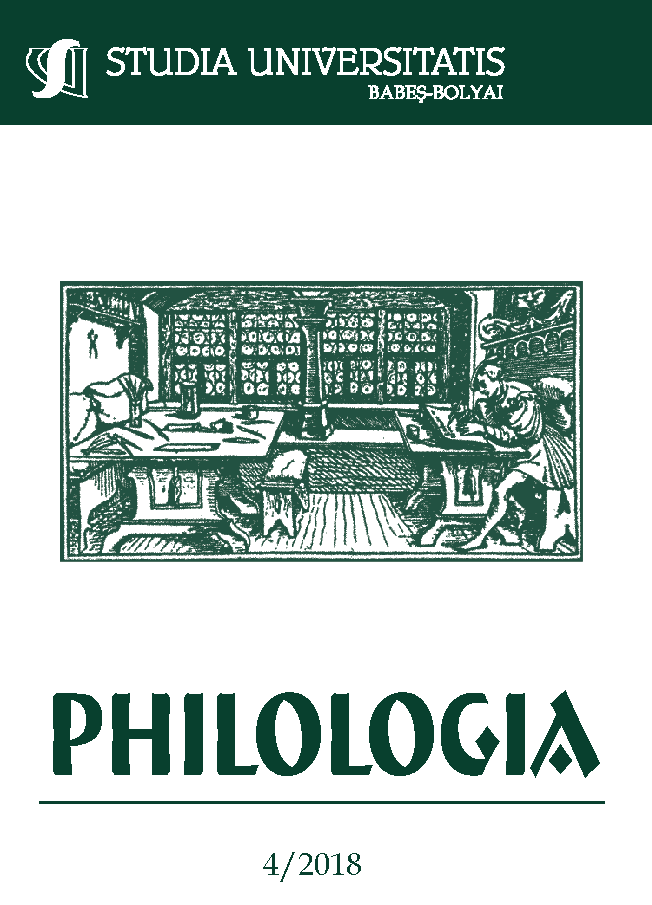EMERGING STORIES: THE (AUTO)BIOGRAPHICAL GAME
DOI:
https://doi.org/10.24193/subbphilo.2018.4.05Keywords:
experimental, (auto)biographical game, memoir, life-writing, interpretive field, self-representational impulse.Abstract
Emerging Stories: The (Auto)biographical Game. The paper is an inquiry into “the game with the (auto)biographical”, as part of the Irish modern and contemporary experimental and innovative prose. The special status of these writings emerges from the self-representational impulse and defines a novel typology about temporality and time-control by the twin action of imagination and memory. The paper refers to the memoir as a complex merging of fiction and non-fiction in an interpretive field where the borderline between the historically verifiable facts and the fictive (constructed) events is unveiled. The Irish contemporary “memoirs”, containing a mixture of analysis and an (auto)biographical game, are viable responses to the emergence of the new and unfamiliar Ireland.
Rezumat. Istorii emergente: jocul (auto)biografic. Lucrarea este o investigație asupra “jocului cu (auto)biograficul”, ca element al prozei irlandeze moderne și contemporane, de factură experimentală, inovatoare. Statutul special al acestui tip de proză își are sursa într-un impuls de auto-reprezentare și definește o tipologie romanescă ce are drept principal scop a controla timpul printr-o acțiune îngemănată a imaginației și a memoriei. Lucrarea se referă la memorii ca la o formă complexă de combinare a elementului ficțional și a celui non-ficțional, într-un câmp interpretativ în care zona de delimitare dintre faptele verificabile istoricește și evenimentele fictive (construite) este revelată. Conținând o mixtură de analiză și “joc cu (auto)biograficul,” memoriile din literatura irlandeză contemporană sunt răspunsuri viabile la apariția unei Irlande noi și nefamiliare.
Cuvinte cheie: experimental, jocul (auto)biografic, memorii, narațiuni biografice, câmpul interpretării, impulsul autoreprezentării.
References
Anderson, Linda. 2001. Autobiography. London and New York : Routledge.
Berce, Sanda. 2010. “Narrative Identity: Questioning Tradition, Probing Modernity”. In Mirror Histories (D. Marza and L. Lapedat eds.). Transylvanian Review, XX, Suppl. no. 4, 251-73.
Bray, Joe, Gibbons, Alison, and McHale, Brian. 2012. The Routledge Companion to Experimental Literature. London and New York: Routledge.
Brown, Terence. 1996. “An Interview to Roza Gonzales in Ireland in Writing.” Interviews with Writers and Academics. Edited by Roza Gonzales. Amsterdam: Rodopi, 49-52.
Brown, Terence. 2006. “Two post-modern novelists: Samuel Beckett and Flann O’Brien”. In The Irish Novel (The Cambridge Companion to). Edited by John Wilson Foster. Cambridge and New York: Cambridge University Press. 205-23.
Casal, Teresa. 2009. “He said Ireland has more than ne story: Multiple Belongings – A conversation with Hugo Hamilton”. In Anglo-Saxonica, University of Lisbon Center for Irish Studies, Series II, no. 27, 49-67.
Dave, Gerald. 2004. “Speckled people: breaking the closed shop of Irish Writing.” Irish Pages LTD.
Deane, Seamus. 1991. “General Introduction” to The Field Day Anthology of Irish Writing, vol. I. Edited by Seamus Deane. Derry: Field Day Publications, XIX-XXVI.
De Man, Paul. 1979. “Autobiography as De-facement.” MLN (Modern Language Notes), 94, no. 5, Comparative Literature. Baltimore : John Hopkins University Press, 919-30.
Donnan, Hastings and Wilson, Thomas M. 1999. Borders. Frontiers of Identity. Nation and State. Oxford and New York: Berg.
Fludernik, Monika. 1996. Towards a Natural Narratology. London: Routledge.
Fokkema, Aleid. 1999. “The Author: Postmodernism’s Stock Character”. In The Author as Character. Representing Historical Writers in Western Literature. Edited by Paul Franssen and Ton Hoenselaars. New York and London: Associated University Press.
Hamburger, Käte. 1957/1993. The Logic of Literature. Bloomington: Indiana University Press.
Hamilton, Hugo. 2006. The Sailor in the Wardrobe. London: Harper Perennial.
Hamilton, Hugo. 2004. The Speckled People. London and New York: The Fourth State.
Hamilton, Hugo. 2007. “Speaking to the Walls in English”. Online at http://www.powells.com/essays/hamilton.html.
Harte, Liam. 2014. Reading the Contemporary Irish Novel 1987-2007. London: Wiley- Blackwell.
Joyce, James. 1976. A Portrait of the Artist as a Young Man. London: Jonathan Cape.
Kearney, Richard. 1988. Transitions: Narratives in Modern Irish Culture, Manchester: Manchester University Press.
Kearney, Richard. 2002. On Stories; London: Routledge.
Kiberd, Declan. 1996. Inventing Ireland. The Literature of the Modern Nation. London: Random House, Vintage.
Kilroy, Thomas.1972. “Tellers of Tales”. Times Literary Supplement, 17 March, 301-2.
Kilroy, Thomas. 1985. The Autobiographical Novel. The Genius of Irish Prose, Augustine Martin Eed. Thomas Davies Lecture Series. Dublin: Mercier Press, 65-75.
Lejeune, Philippe. 1989. On Autobiography. Edited by Paul John Eakin, translated by Katherine Leary. Minneapolis: University of Minnesota Press.
McGahern, John. 2006. Memoir. London: Faber and Faber.
N’Duessan, Kouadio. 2013. “A conversation with Hugo Hamilton.” Online at http://cle.ens-lyon.fr/anglais/litterature/entretiens-et-textes-inedits/the-speckled-people-a-conversation-with-hugo-hamilton.
O’Brien, George. 2006. “Contemporary Prose in English: 1940 -2000”. In The Cambridge History of Irish Literature. Edited by Margaret Kelleher and Philip O’Leary. Cambridge and New York: Cambridge University Press, 421-77.
O’Hagan, Sean. 2005. “John McGahern – Interview with Sean O’Hagan.” Online at https://www.theguardian.com/books/2005/aug/28/fiction.features3.
Ricoeur, Paul. 1988. Time and Narrative, vol. I. Chicago and London: Chicago University Press.
Ricoeur, Paul. 1999. “Reflections on a New Ethos of Europe”. In Paul Ricoeur: A Reader. London: Routledge.
Tóibín, Colm. 1992. “The Field Day Anthology of Irish Writing by Seamus Deane.” The Canadian Journal of Irish Studies, 18, no. 2, 118-26 (http://www.jstor.org./stable/25512933).
Serres, Michel. 1993. Les origines de la géométrie. Paris: Flammarion.
Thomsen, Mads Rosendahl. 2010. Mapping World Literature. International Canonization and Transnational Literature. London and New York: Continuum Publishing.
Widdowson, Peter. 1999. Literature. London: Routledge.
Downloads
Published
How to Cite
Issue
Section
License
Copyright (c) 2018 Studia Universitatis Babeș-Bolyai Philologia

This work is licensed under a Creative Commons Attribution-NonCommercial-NoDerivatives 4.0 International License.





 ©Studia Universitatis Babeş-Bolyai Philologia. Published by Babeș-Bolyai University.
©Studia Universitatis Babeş-Bolyai Philologia. Published by Babeș-Bolyai University.